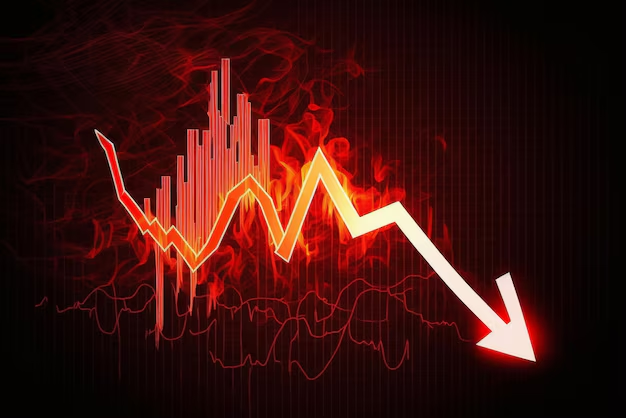Understanding Today's Stock Market Decline: Causes and Context
Every investor has experienced that unsettling moment when they check the stock market and see a sea of red. Questions like "Why is the stock market down today?" often arise, propelling many to seek explanations behind these sudden fluctuations. Fear not—this guide provides a clear, comprehensive overview of why the stock market may experience downturns, helping you stay informed and prepared during these volatile times.
📉 The Basics: What Influences the Stock Market?
Before diving into specific reasons for today's downturn, it's essential to understand the general factors that influence stock market movements. These include:
Economic Indicators: Stock markets often respond to key economic data releases, such as unemployment rates, GDP growth, and consumer confidence indices.
Corporate Earnings: Company performance reports can sway investor sentiment, particularly when results deviate from expectations.
Monetary Policy: Central banks play a crucial role through interest rate decisions and other monetary policy measures.
Global Events: Geopolitical tensions, natural disasters, and pandemics can lead to uncertainty and market instability.
Investor Sentiment: The market is also driven by investors' perceptions and reactions, which can sometimes lead to overreactions to news and events.
Understanding these elements provides a foundation for assessing why the stock market may be down on a given day.
🌍 Today's Global Context: Key Events Impacting the Market
Economic Reports
Frequently, stock market downturns coincide with the release of negative economic data. Has there been a surprising spike in inflation, unexpected job losses, or weak consumer spending? These indicators can create headwinds for the market, as investors reassess the economic outlook.
Geopolitical Tensions
Political instability, whether through elections, trade disputes, or military conflicts, can significantly impact investor confidence. For instance, increased tariffs between major economies could incite fears of a trade war, prompting market declines.
Natural Disasters
Events such as hurricanes, earthquakes, or pandemics can disrupt production, influence commodity prices, and affect consumer behavior, rattling the stock market.
📈 Investor Behavior: Sentiment and Reaction
Panic Selling
Emotionally-fueled decisions often lead to what's known as "panic selling," where investors sell off stocks out of fear rather than strategy. This can drive the market down more steeply, as seen in past financial crises.
Speculation
Sometimes speculative bubbles burst, leading to precipitous declines. If investors perceive a market or asset class as overvalued, they might initiate mass sell-offs, contributing to a downturn.
Market Correction
A "market correction" refers to a short-term drop of 10% or more from a recent peak, which resets inflated stock prices to more realistic levels. This is a natural part of market cycles.
💡 Practical Tips for Navigating Market Declines
It's normal to feel concerned when the market dips, but keeping a level head can help you make well-reasoned decisions. Here are some practical tips to consider:
Stay Informed: Keep abreast of current events and market analyses to understand the factors influencing changes.
Diversify Your Portfolio: A well-diversified portfolio can mitigate losses during market downturns.
Think Long-Term: Stocks often recover over time. Avoid making knee-jerk decisions based solely on daily fluctuations.
Consult a Financial Advisor: If uncertain, consult professionals who can provide personalized investment advice.
📋 Quick Summary: Keeping Calm During Market Volatility
📉 Economic Data: Pay attention to economic reports that might indicate broader trends.
🌍 Global Events: Be mindful of geopolitical tensions and their potential impacts.
💸 Investor Behavior: Watch for panic selling and speculation as indicators of short-term volatility.
📊 Diversification: Maintain a diversified portfolio to reduce risk.
📅 Long-Term Focus: Remember that markets generally recover over the long haul.
🔍 Common Misconceptions: What the Stock Market Isn't
While observing fluctuations, it's crucial to remember what the stock market doesn't do:
Predict the Future: While many interpret market trends as economic forecasts, stocks can often reflect current conditions or past performance rather than future realities.
Always Rational: Micro influences like rumors or individual investor behavior can lead to irrational market movements.
🤔 Frequently Asked Questions (FAQ)
Why do sudden market drops happen?
Sudden drops can be attributed to unexpected news or data releases, technical factors triggering automated sell-offs, or shifts in investor sentiment.
How can I know if a decline is part of a market correction?
Market corrections generally involve a 10% decline from recent highs and are a regular aspect of market cycles, providing opportunities for buying.
Should I sell my stocks when the market is down?
Deciding whether or not to sell should be based on sound investment strategy and long-term goals, rather than short-term market movements.
✨ Final Insight
While stock market downturns can induce anxiety, understanding the underlying factors helps demystify these occurrences. By staying informed and focusing on long-term strategies, investors can navigate market declines more confidently. Remember, volatility has always been part of investing, and with careful planning, it's possible to weather the storms that come along the way.

Related Topics
- Did The Stock Market Crash
- Did The Stock Market Crash Today
- How Did The Stock Market Close Today
- How Did The Stock Market Do Today
- How Did The Stock Market End Today
- How Did The Stock Market Finish Today
- How Do You Make Money In The Stock Market
- How Does The Stock Market Work
- How Is Stock Market Doing Today
- How Is The Stock Market Doing
